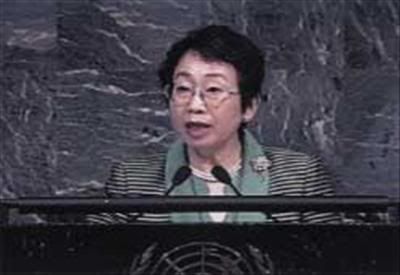
(Iwao Sumiko-San)
Today we look at the work The Japanese Woman by Sumiko Iwao.
She is a woman who, according to her book:
“was involved in the founding of the International Group for the Study of Women and, with the co-operation of other members, led various studies on women (investigation, for example, the effects of mothers’ work on children). We held international symposia, workshops, and lecture series on the results of our studies and invited to Japan speakers such as Matina Horner and Betty Friedan (Iwao p. x-xi).”
Iwao san is no friend of men.
Her work is an interesting analysis of why, as I have written in previous posts for the Honor Network, feminism has not achieved the spectacular successes that it has in the West.
On the subject of Equality, Mrs. Iwao writes:
“ Equality is an ideal, but the question of what women want to be equal to is crucial. Apparently, attaining equality with men has been the goal for American women. In Japan increasing attention is being focused on the “humane life,” which transcends both men and women. The fact that such Freudian concepts as penis envy and castration complex (i.e. the sort of men vs. women complexes) have stirred little interest in Japan may have contributed to this sort of thinking. The waves of the international movement for liberation of women from the grip of traditional roles lapped at Japan’s shores in the 1960s but did not set many further waves into motion. It was not until the United Nations Decade for Women in 1975, which lent the women’s rights movement mainstream dignity, that the Japanese government began to consider public policy measures to overcome the discriminatory practices preventing the improvement of women’s status (p. 12).”
This confirms my view that feminism was a foreign movement that was brought to Japan and incubated by outside powers until it could marginally survive on its own. We also see that the United Nations has long been a thorn in the side of traditionally minded people the world over.
The writer continues:
“Different paths may be taken in achieving equality between men and women, and it would seem that they diverge quite a bit in Japan and the United States, although both are at least officially committed to the principle of equal opportunity for men and women in education, job recruitment, employment, training, promotion, and retirement benefits (p. 12).”
Japan watchers know that the public face that Japanese people show, known as Tatemae in Japanese, and the innermost thinking, known as Honne, are quite different. Men and women alike continue to maintain their traditional approaches to relations between the sexes. While there are young Japanese who are more Western minded, such foreign thinking only goes so far.
This traditional thinking helps to explain why Western style feminism will ultimately be expunged from Japan. It’s only a matter of time before they revert back to the customs that have served them well for over 2000 years.
Traditional Japanese culture has had many many centuries to develop, whereas the lifespan of feminism is but a mere hiccup, something brief that will be easily forgotten.
Mrs. Iwao notes that:
“…In United States the status of men is seen as superior to that of women and apparently is the target of women’s struggle for equality. Women, we hear it argued, are able to do anything that men do, and we now read the extreme care taken in some cases to avoid differences in treatment on the basis of sex. One result of this view of equality, for example, is the abolition of maternity leave for female faculty members at Barnard College, which produces many of America’s best educated, most professionally accomplished women… we presume that the new policy was based on the assumption that women ought not to be coddles but should be ready to work under the same conditions as men and that eliminating maternity leave was viewed as a step toward greater equality between men and women (p 12-13).”
And this is the crux of the argument against feminism as a philosophy.
I would be all for feminism if it enforced the doctrine of Equal Rights, instead of Special Rights, for women. Every human being has fundamental, God given rights and responsibilities.
But as we know all to well, feminism in practice is totalitarian, grasping, and cruel to both sexes.
Feminists preach autonomy and androgyny, above all else.
As I have maintained previously on the Honor Network, Japanese women embrace their femininity. Consequently, philosophies such as feminism, that maintain that the only way to freedom is the rejection of their own womanly nature, are...
1) Dissected for their useful parts and,
2) Summarily dismissed.
Iwao-san continues:
“It is an illusion to think that men and women are completely and literally equal, at the very least on the basis of the biological fact that only women are able to bear children, and to draw up organizational rules on that basis… while opinion among Japanese women is diverse, the general view is that equality has to be considered within a broad framework that takes into account inherent sexual differences, personal preferences, and a balance of various factors (p. 13).”
“Japanese women also view the issue of equality in terms of burdens and freedoms involved. Believing, for example, that women are biologically best equipped to shoulder the bulk of the burden of child rearing, especially in the early stages, they believe they have every right to take maternity leave and other special benefits related to childrearing without apology. And women are willing to grant a husband who provides the economic support for the household exemption from the bulk of household responsibilities. In facing day to day situations, Japanese women tend to be extremely pragmatic; they are not necessarily concerned with achieving equality with men in terms of disposal of time and energy or even in terms of income or status rewards for performance. More important, they believe, is whether a woman is able to pursue her goals according to her individual preferences (p. 14-15).”
Contrast this with the utterly selfish attitudes of the vast majority (good Western girls know who they are) of Western women today. A quick rundown of the Magnificent Eternal Bachelor blog, or the Enlightening American Women Suck website, will enlighten the reader to the narcissistic condition of the Western woman today.
The reader will understand how a great many Western women have their cake and eat it too; and they will also know that today’s feminized woman wants all of her rights, but avoids her responsibilities like the plague.
And, to add insult to injury, these same wicked Western women, more often that not, expect someone else to foot the bill for their childish and tragically wrong life choices!!
However, as morally bankrupt as many Western women are today, we must not forget that Japanese women are not totally innocent either.
As the author states:
“ A reflection of this belief is the reluctance of Japanese women to pursue the career modes and goals of men today; equality is all very well, but if it means having to work so hard that individual pleasures and private fulfillments are not permitted, they are content to do without it. Men’s lives in Japan today are confined and regimented by their jobs to an extreme; they are alienated from their households and deprived of time to engage in culturally enriching pursuits. This is not a model women think worthy of emulation. On the contrary, they think that happiness for both men and women would be better assured by a model of equality in which men were given the same freedom, rights, and options in the three main areas of life (work, family, leisure) that women currently enjoy (p. 15).”At the present moment, Western media brainwashing aside, Japanese women are doing right by themselves, having skillfully adopted certain feminist tenets to create female dominated enclaves of their own.
Consider:
'Women only' signs make Japan's men fume
JULIAN RYALL IN TOKYO
AT THE time, most people agreed it seemed a good idea: carriages on Japanese commuter trains set aside specifically for females would dramatically reduce the number of women being molested by the chikan who get their kicks by having a sly fondle among the tightly packed bodies. And it worked.
The idea was so effective that it was quickly adopted by numerous train companies across the country, with pink signs adorning certain carriages warning men to keep their distance.
What is less welcome, however, is the sudden embracing of an entire male-free environment by whole sectors of the Japanese service industry.
It has become so common to see "no males" signs outside stores, restaurants, hotels, spas and even entertainment outlets that the victims of this policy are beginning to grumble that they are becoming second-class citizens.
"I completely supported the whole thing with women-only train carriages, even though it made my commute more difficult because there always seemed to be room in those carriages while us men were squeezed together tighter than ever," one Tokyo businessman said.
"But now it's just getting silly. I couldn't even get into my gym at my regular time last week because they have introduced a 'women-only' hour in the early evening."
Responding to a survey in the weekly news magazine Aera, 55 per cent of men said matters have gone too far. Perhaps surprisingly, 40 per cent of women agreed, saying the complete exclusion of men amounts to sex discrimination.
Men turning up at restaurants are being turned away because the women-only lunch special is on the menu, while convenience stores, cinemas and even pachinko parlours - the pinball gambling game that is the staple for the weary workers - are out of bounds for the boys, either permanently or for parts of the day.
"All these other establishments are simply jumping on the women-only bandwagon because they see an economic opportunity in it," says Toshiko Marks, a professor of multicultural understanding at Shumei University.
"It's well-known that single women today have a lot of money, so companies are exploiting that. Men are definitely starting to complain."
For those who have never lived with, or loved a Japanese woman, the image of her as a weak creature that is an utter doormat is very much mistaken.
Japanese women hold tremendous power; using either the sword of feminism, or the halberd of traditional shaming power, as appropriate to the given situation.
Be that as it may, Western style feminism has a limited future, simply because Japanese ladies themselves don’t want the social chaos and wage slavery that Western women find themselves increasingly attached to.
Iwao san writes that:
“Admittedly, this approach to equality has its unhealthy side as well. By their less than eager pursuit of equal treatment with men, Japanese women know full well that having to bear equal economic responsibilities with men is by no means a situation that serves their best interests. True equality with men would pare down their current options considerably. There is a tendency to envoke the issue of equality only when it is convenient (p. 16)…”
And what do the men think of all this?
According to Mrs. Iwao:
“…many men continue to view women as not fully adult, an attitude that dominated the thinking of the old family system. Inasmuch as they completely monopolize responsible positions in politics, government, finance, and other national institutions, men continue to presume that they are the sole responsible members of society (p. 18).”
And for good reason. If a human being, male or female, demands Special Rights, and not Equal Rights, then they are NOT responsible persons in any way, shape or form.
They are indeed, childlike.
People (in this case, the women of the world that refuse to grow up and accept the responsibilities and the obligations that go hand in hand with the rights that they have demanded over the last 40+ years) who refuse to act like adults, do not deserve to be treated like adults. Period.
One should note that there are many men today that view women as equals, something that our author does not concede. But in the main, her analysis of the situation in Japan, in my view, is accurate.
My prediction: Feminism has no long term future in the Land of the Rising Sun.
In Japan, there are only Japanese solutions.
Kumogakure.


![[Most Recent Quotes from www.kitco.com]](http://www.kitconet.com/charts/metals/silver/t24_ag_en_usoz_2.gif)
![[Most Recent Exchange Rate from www.kitco.com]](http://www.weblinks247.com/exrate/24hr-jpy-small.gif)









10 comments:
Very Interesting and well written.
Many thanks! ^ ^;
Excellent! As Hawaii is the favored tourist locale for Japanese, I've met and interacted with MANY Japanese people. I also had a Japanese girlfriend for a little while when I was a 19 year old kid in community college. And I must say, based on my experiences, I KNOW the following is TRUTH:
For those who have never lived with, or loved a Japanese woman, the image of her as a weak creature that is an utter doormat is very much mistaken.
Japanese women hold tremendous power; using either the sword of feminism, or the halberd of traditional shaming power, as appropriate to the given situation.
Thanks boss!!
I think the biggest difference between American girls and Japanese women is at least Japanese girls know how to cater to a man's needs, even while they are manipulating (not always a bad thing) their man covertly instead of seeking to dominate the crap out of him like Western women tend to do.
At least a man gets his food, sex, and companionship needs met while his Japanese wife/g.f. is giving him hell!! :)
Guys,
Please don't be fooled by the Japanese girls. They are not dumb at all. But because they can't speak openly about things they are devious.
I heard all the "Asian women are better for men" only to think myself WTF because I have seen a thing or two in my life that contradicts this. And then men started speaking up on a NZ men's site to clarify my knowledge.
Also it is embarrassing when I am holding a group for men with speakers that say infront of me, "Western women are terible, marry an Asian"
All the men in the room turn to me for a reaction. How embarrassing. I can't agree with this.
Actually, I am offended by this, so sorry for going on, I will get over it though, but nearly all the men who are fighting men's rights are anti western women and married to Asian women.
Sorry, but I have to have a bitch about this. Why am I the only women fighting beside them and supporting them in their fight for justice. Where are thier wives?
You should give us western women a bit of a break. We can cook and clean and satisfy a man too. Yet, I think you need more from women today.
Just wait ... things will change for the Asians soon enough. And besides some of these Asian women kill western men. Western males are a target to some awful things in Asian countries.
I think I need to enlighten you to the amount of men being ripped off in Asian countries by women and the stats your and mine Embassy hold.
But please challenge me, if I have something to learn because I will not hold back on challenging you. It is a part of my character to question things.
julie, if you are the ONLY woman fighting along side men for their rights, is it no WONDER that they have a higher opinion of Asian women that western? I'm sorry but we cannot give western women breaks.
We can cook and clean and satisfy a man too.
Right. Western women are too lazy and too busy trying to be men to cook for their men. Think about it. How often do you hear a woman say she loves it when a man can cook?? I hear it often. Yet when a man expresses his desires for women to cook for her???/
Julie, I don't mind that you fight for men's rights. Such actions are welcomed. But please don't let teh fact that YOU are a Western woman cloud the TRUTH about Western women as a whole. peace.
tba,
I could have expressed things a little better. There are Western Women that fight for men's rights especially where I am. I just don't get the chance to meet them. There are many women behind the scenes too. It isn't fair if I make myself out to be 'the only' when infact I am not. And plus I am new and haven't learn't enough of the decades of work that has been done. I hear great stories of wonderful women.
I do understand why men feel this way towards western women.
I am just a bit concerned of misleading males (especially the young) for very serious reasons which I do not ned to get into. I am sure the MRA is very aware of Asian cultures.
Tba,
I forgot to answer your question.
**How often do you hear a woman say she loves it when a man can cook?? I hear it often. Yet when a man expresses his desires for women to cook for her???/ **
I see your point.
^ ^
No worries. Julie and I had some very interesting conversations behind the scenes, and all is forgiven.
It is my policy to resolve matters between MRAs and our allies behind the scenes.
Why give the femibots ammunition??
Kumo.
Post a Comment